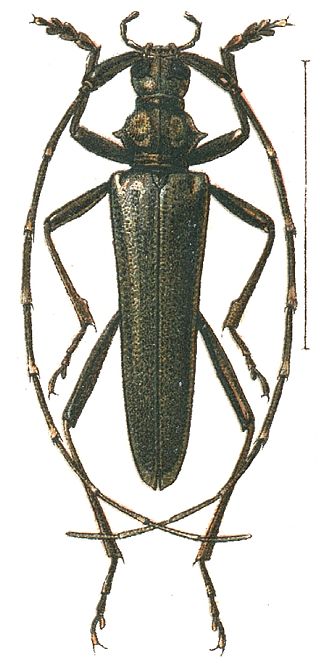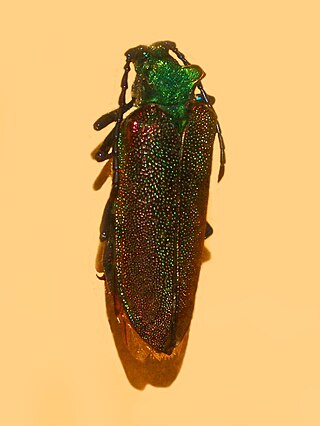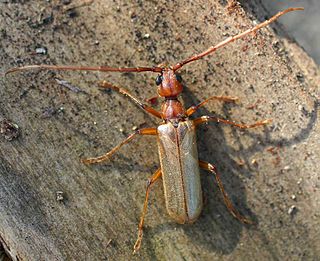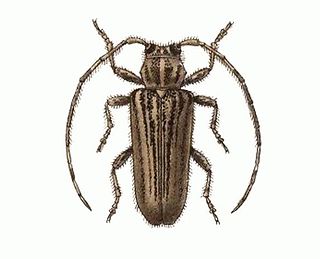
The longhorn beetles (Cerambycidae), also known as long-horned or longicorns, are a large family of beetles, with over 35,000 species described. Most species are characterized by extremely long antennae, which are often as long as or longer than the beetle's body. In various members of the family, however, the antennae are quite short and such species can be difficult to distinguish from related beetle families such as the Chrysomelidae. The scientific name of this beetle family goes back to a figure from Greek mythology: after an argument with nymphs, the shepherd Cerambus was transformed into a large beetle with horns.

The Chrysomeloidea are an enormous superfamily of beetles, with tens of thousands of species. The largest families are Cerambycidae, long-horned beetles, with more than 35,000 species, and Chrysomelidae, leaf beetles, with more than 13,000 species.
Charles Joseph Gahan was an Irish entomologist who specialized in beetles, particularly the Cerambycidae. He served as keeper at the department of entomology in the British Museum for thirteen years after Charles Owen Waterhouse.

The Prioninae are a subfamily of Cerambycidae. They are typically large (25–70 mm) and usually brown or black. The males of a few genera sport large mandibles that are used in fights with other males, similar to stag beetles. These beetles are commonly nocturnal and are attracted to light. The majority of the Prioninae whose biology is known are borers whose larvae feed on rotting wood or roots.

Per Olof Christopher Aurivillius was a Swedish entomologist.

Lamiinae, commonly called flat-faced longhorns, are a subfamily of the longhorn beetle family (Cerambycidae). The subfamily includes over 750 genera, rivaled in diversity within the family only by the subfamily Cerambycinae.

The Disteniidae are a small family of beetles in the superfamily Chrysomeloidea, traditionally treated as a group within the Cerambycidae.

The Oxypeltidae are a small family belonging to the superfamily Chrysomeloidea, widespread in the Andean region of Chile and Argentina. They have traditionally been considered a group within the Cerambycidae.

The Vesperidae are a small family of beetles, normally classified within the family Cerambycidae, of heterogeneous aspect but all characterised by larval stages related to roots of herbaceous plants or trees

Lepturinae, the lepturine beetles, is a subfamily of the longhorn beetle family (Cerambycidae), containing about 150 genera worldwide. This lineage is most diverse in the Northern Hemisphere. Until recently the subfamily Necydalinae was included within the lepturines, but this has been recently recognized as a separate subfamily. Nine tribes are usually recognized today, with a tenth, Caraphiini, created in 2016. A few genera are of uncertain placement within the subfamily.

Stephan von Breuning was an Austrian entomologist who specialised in the study of beetles (coleopterology), particularly within the longhorn family (Cerambycidae).

Dorcasominae is a subfamily of the longhorn beetle family (Cerambycidae).

Trachyderini is a tribe of long-horned beetles in the family Cerambycidae. There are at least 140 genera and 650 described species in Trachyderini.

Onciderini is a tribe of longhorn beetles of the subfamily Lamiinae, they are prevalent across Europe in nations such as Turkey, and Finland.
Dmytro Zajciw was a Ukrainian and Brazilian entomologist, notable for his collection and for his many beetle discoveries. He was born in Velyka Mykhailivka, Ukraine and died in Rio de Janeiro, Brazil. He was the author of Two new genera and species of neotropical Longhorn beetles , 1957, Contribution to the study of Longhorn beetles of Rio de Janeiro , 1958, and was the first to describe the genera Adesmoides and Pseudogrammopsis, as well as the species Beraba angusticollis and Mionochroma subaurosum, among many others.
Estola benjamini is a species of beetle in the family Cerambycidae. It was described by Stephan von Breuning in 1940. It is known from Colombia.
Estola brunnescens is a species of beetle in the family Cerambycidae. It was described by Stephan von Breuning in 1940. It is known from Colombia and Venezuela.
Estola nigropunctata is a species of beetle in the family Cerambycidae. It was described by Stephan von Breuning in 1940. It is known from Brazil.
Estola freyi is a species of beetle in the family Cerambycidae. It was described by Stephan von Breuning in 1955. It is known from Trinidad.

Estola vittulata is a species of beetle in the family Cerambycidae. It was described by Henry Walter Bates in 1874. It is known from Panama, Mexico and Venezuela.












